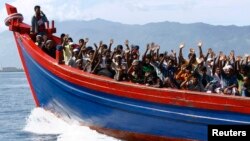A new U.N. report points to a sharp increase in numbers of boat people mostly from Myanmar, also known as Burma, and Bangladesh. Activists fear a further surge of refugee boat people, especially ethnic Rohingya fleeing squalid refugee camps and persecution in Myanmar.
The report by the U.N. High Commission for Refugees says from June 2013 to June 2014 more than 53,000 people have fled by sea from the Bangladesh-Myanmar border region, an increase of 60 percent from the previous year.
More than 20,000 boat people fled in the first six months of this year, headed toward the Malaysia-Thailand border or on to Indonesia and Australia.
Chris Lewa, a rights activist and researcher on the ethnic Rohingya of Myanmar's western Arakine state, says after a lull in departures more people appear ready to risk their lives at sea.
"It is very worrying, and the fact that the situation that it is not going to stop. Since the 10th of August we noticed again several boats leaving within a short span of time and that means it will probably continue to increase again as the [sailing] season really picks up," she said.
The U.N. report says more than 200 people have perished at sea and more 7,000 boat people are now held in detention centers across the region. In addition to the 20,000 boat people from Bangladesh and Myanmar, hundreds have attempted to reach Australia.
Australia has enacted policies to prevent boats from reaching it shores, including intercepting boats at sea and holding refugees at offshore camps in Nauru.
Many of those fleeing are ethnic Rohingya from Myanmar. They face increasing violence and discrimination. In 2012, bloodshed between Muslim Rohingya and Buddhist communities led to 280 deaths and forced more than 140,000 people, mostly Rohingya, into camps.
The U.N. Special Rapporteur on human rights in Myanmar, Yanghee Lee, described the camp conditions as "deplorable."
Activist Lewa says the refugees often face violence and malnutrition at the hands of the traffickers, with regional governments responding inadequately to the crisis.
"One of the problems of course is there is no regional response to this problem and there is very little access to protection, as you see that most of these people end up in Malaysia, but also others are caught in Thailand. There is still a number in detention in Thailand at the moment; there is probably going to be more in the coming weeks and months," she said.
The UNHCR says it is providing assistance to the refugees in Thailand and Malaysia, including providing education and medical assistance.




